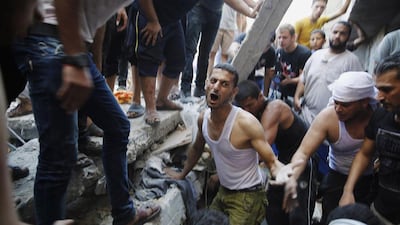In recent weeks, people across the world have taken to the streets to protest against Israel's onslaught on Gaza. In Paris, thousands of protesters converged despite a ban, risking a prison sentence of up to six months. That authorities would go so far as to ban a march in solidarity with the Gazans underscores how sensitive the Israeli-Palestinian conflict has become in French politics. France is at the forefront of a wider trend in Europe in which increasingly diversified societies are demanding a different foreign policy course on the conflict.
Domestic issues aside, the protests raise questions about France’s ambiguous position on the Israel-Palestinian conflict. France, like the international community, has reached a moral and rhetorical impasse in trying to uphold a fictional balance between the two sides.
Yet France once played a singular role in the region. It was the late socialist president François Mitterrand who, as a friend of Israel, balanced France’s traditionally pro-Arab policy by seeking better ties with the Israelis. However, having witnessed the misery of the Gaza refugee camps, he spoke in 1982 before the Knesset of the need to accept a Palestinian state, almost 20 years before an American president did.
The time is ripe for a new policy now the peace process has floundered. As street scenes across Europe have shown, domestic political developments will soon demand it. The protests herald the rise of the “Gaza generation”, as the French daily Le Monde put it, that demands a values-based foreign policy for the Israeli-Palestinian conflict. Adding to the pressure is the close to 90 per cent of French Muslims who voted for François Hollande as president.
For religious and secular French Arabs, the Palestinian struggle is a powerful mobilising factor because of its symbolism. The anger expressed by third-generation French Arabs at their government’s inability to be on the right side of history is mirrored by their sense of alienation from their home country.
France, home to Europe’s largest Muslim and Jewish communities, also risks being contaminated by inter-religious strife. It is thus more important than ever to abandon France’s ambiguous position on the Israel-Palestinian struggle, which on these occasions acts as a catalyst for communal tensions.
While all French heads of state since Mitterrand supported the creation of a Palestinian state, none of them took significant action to help make it happen. Over the past decade especially, France’s distinctive voice in the region has become muddled. Under Nicolas Sarkozy, France strengthened political and economic ties with Israel, and pushed the EU to do the same. Mr Sarkozy also aligned himself closely with hardliners in Israel and the US on Iran. Mr Hollande has continued down the path set by his predecessor. In 2011, his Socialist Party called for the recognition of a Palestinian state, a call that has been ignored by Mr Hollande since taking office.
But Mr Hollande is struggling with Mitterrand’s legacy. In the past, France regularly challenged the western consensus on backing Israel unconditionally. It became an influential mediator, and Mitterand helped to turn Yasser Arafat’s Palestinian Liberation Organisation into a political force. Mitterrand is seen as the left’s moral compass, and he certainly would have denounced Israel’s flouting of international law.
Days before the protests, Mr Hollande declared that he refused to see the conflict “imported” to France. He fears a toxic brew of Islamophobia and anti-Semitism as already tense societal relations are superimposed with pro-Palestinian and pro-Israeli sentiments. Yet, the government has only further internalised a conflict around which opinions have hardened in recent years while both anti-Semitic and Islamophobic attacks are on the rise.
Prime minister Manuel Valls created a disconcerting amalgamation by claiming a “new” anti-Semitism played a role in the protests. There are also concerted efforts to link support for the Palestinians to a new breed of anti-Semitism in Europe.
The protests came at the back of the president’s jumbled communication on Operation Protective Edge. Many were surprised to see Mr Hollande give Benjamin Netanyahu a blank cheque to deal with Gaza as he pleased in a communiqué of support. No matter the hurried second statement expressing concern for civilian casualties without laying any blame, the impression was that France stood firmly behind Israel.
But increasingly, the Palestinian cause is gaining ground beyond Arab and Muslim circles, both in France and in Europe. Polls have found that the gap between European publics and their governments over policy towards Israel is growing. While the seeds for this swing were planted in the 2008 war on Gaza, the mood across Europe has turned against Israel and a tipping point possibly reached with the latest violence. As the conflict brought about a humanitarian catastrophe, France adopted an unusually tough tone with Israel, which might suggest the possibility of a less accommodating approach in the future.
Europe can have a huge impact on the conflict if it wants to. The EU is Israel’s largest trading partner and European pressure has been building, recently with moves to penalise Israel for its settlement policy. Yet, EU policy will not change if the “big three”, France, Germany and the United Kingdom, do not change their position. Europe has given up on the peace process and France might be in the best position to get it involved again.
What is certain is that sitting – or rather, wobbling – on the fence is an untenable option for France and other European states. With the conflict increasingly acting as a catalyst for clashes at home, the changing mood in European societies regarding Israel and the desire to return France to its singular place on the global stage, Mr Hollande would do well to channel more Mitterrand and less Sarkozy, and press the EU to get tough with Israel.
Bart Hesseling is a research analyst with the Delma Institute in Abu Dhabi, specialising in relations between Europe and the Arab world

